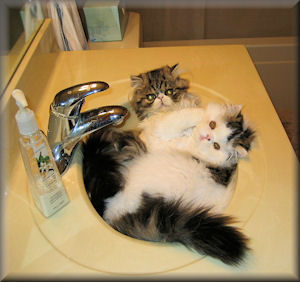Strange Cat Behaviors

Calvin & Hobbs
As a long-time pet owner of both cats and dogs, it has always been obvious to me that dogs and cats communicate and have social interactions in different ways. If you are scratching your head in confusion about your cat's behavior this article may help you figure out your cat is trying to communicate with you.
Because cat behavior is so unique we love them even more when they decide to show us affection by head-butting us or being silly and stuffing their large body into a small box. Most behavior that we humans consider weird or unusual are normal in the feline world. Below are our top cat behaviors that people usually contact me about.
Head Butting
Presents
Your cat brings you dead rodents or insects and either leaves them at your feet or at the door as a gift. Animal behaviorists have many theories about this such as:
- As a kitten, the mother might have brought back dead prey.
- Feral cats who can get more food than they need for themselves will often bring the extra "food" back to other members of the cat colony, especially if there are kittens and nursing mothers present. Perhaps your domestic cat suspects that you need help with providing food by offering extra "food".
While humans find this practice gross do not punish a cat for displaying this normal behavior. Instead, keep the cat indoors.
Vocalization
Many cats like to chatter at birds they see out a window. A few theories for this rapid, chattering sound is:
- pent-up frustration at not being allowed outside to hunt the birds; or perhaps,
- it is some type of instinct allowing cats to prepare their muscles for the act of bringing down prey.
Kneading
Staring
Ignoring You
Nocturnal Crying
Chewing On or Eating Weird Things
Boxes and Other Small Spaces
Every cat owner I know, including me, has spent many hundreds of dollars on beds, climbing trees, cat condos, etc. only to see the cat choosing a small space, a cardboard box, an uncomfortable bathroom sink or similar small, hidey-holes.
Why do cats do this? Small spaces make cats feel more secure and safe. In the wild cats need stealth to survive, so sleeping in the middle of a wide-open space would make them prey to larger predators. Curling up in a small hole (den) on the other hand makes it more difficult for a predator to find them. A good signal that your cat is asking you for some "quiet" time is if you find him curled up in a small box or space. It's a good idea to let them alone as he will seek you out later after his nap.
The Zoomies
Litter Box Issues
Most (but not all) cats will cover their waste in the litter box. If you happen to have a cat that is meticulous in its litter box habits count yourself one lucky owner. However, if a cat who has always had tidy litter box habits suddenly stops covering its waste (or not even using the litter box) this could be a sign of a serious medical condition such as a urinary tract infection or blockage.
It is important to rule out any medical problem by taking the cat to the veterinarian.
If no medical condition exists to explain why a cat suddenly does not want to cover their waste or use their litter box then it is a behavioral issue.
It could be a simple as a change in the litter the cat was familiar with or perhaps the cat has decided the box is too small and prefers a deeper or wider litter box or a hooded one. Perhaps the litter box is not clean enough to satisfy your cat's fastidious nature or there was a change in the household (new baby, new spouse, new home). In multi-cat households the rule of thumb is one litter box for each cat plus an extra one. For example, if you own 4 cats, you should have 5 litter boxes.
A sudden change to litter box habits is either a medical condition or the cat is trying to tell you that they are unhappy about something (i.e., change in litter, new baby, etc. as mentioned above).
It is up to us to figure out what is bothering the cat in order to fix the issue BEFORE it becomes a habit.
